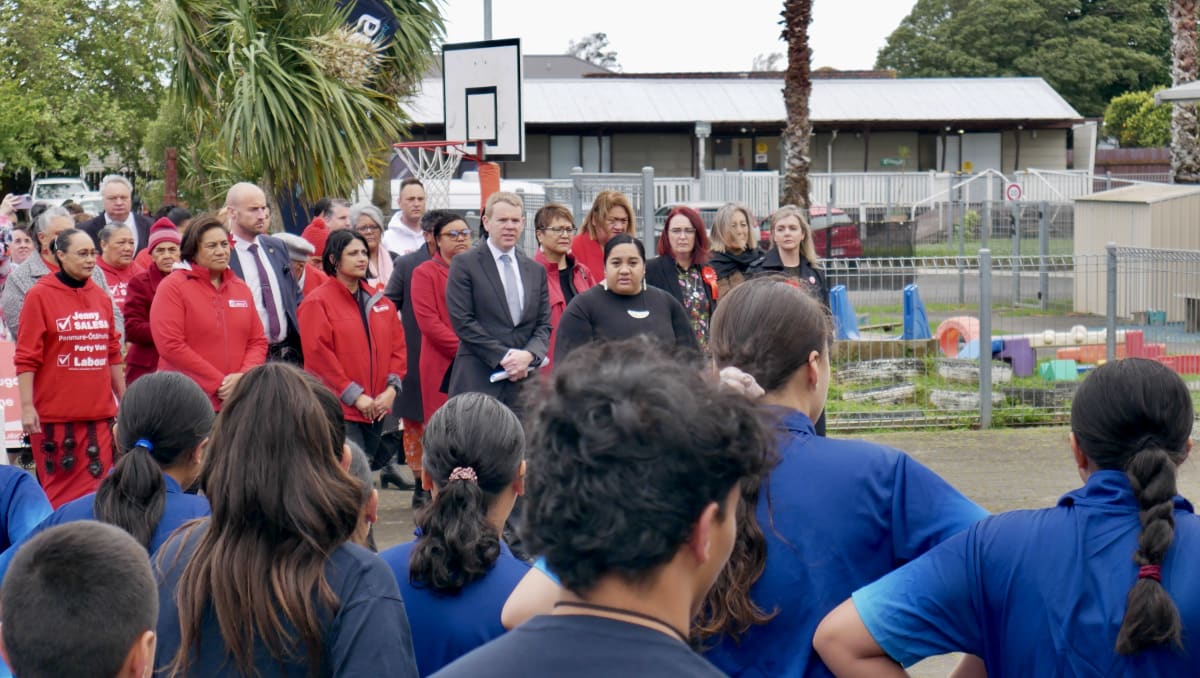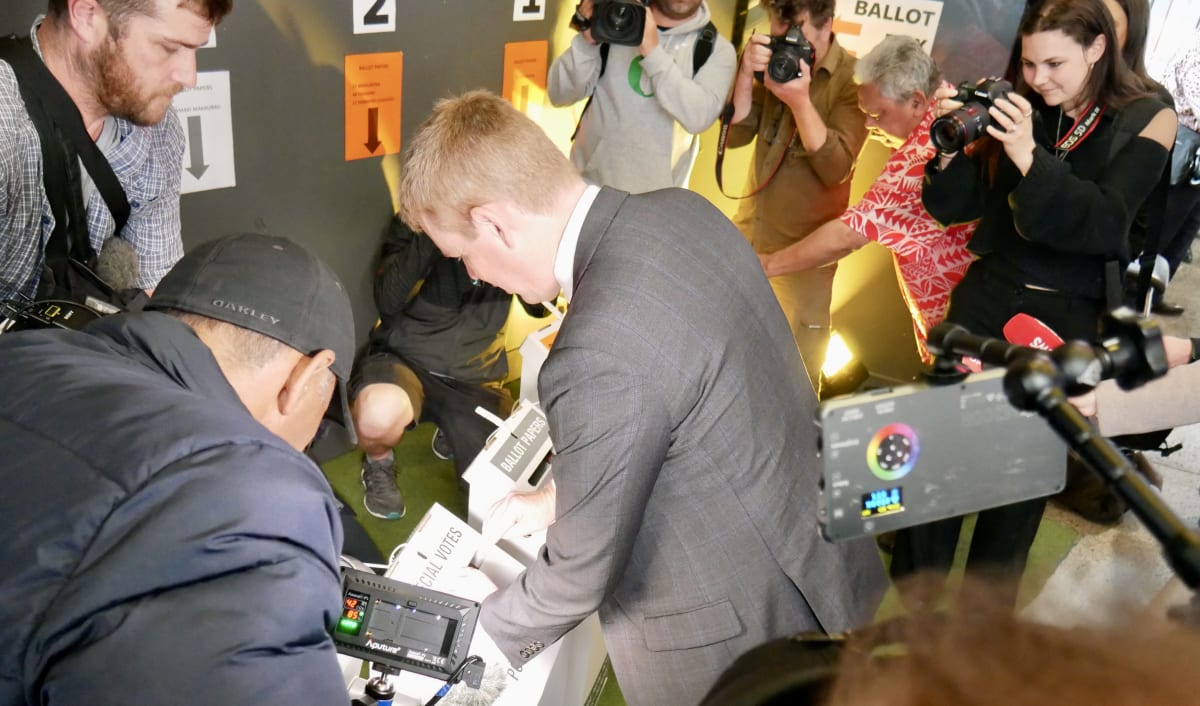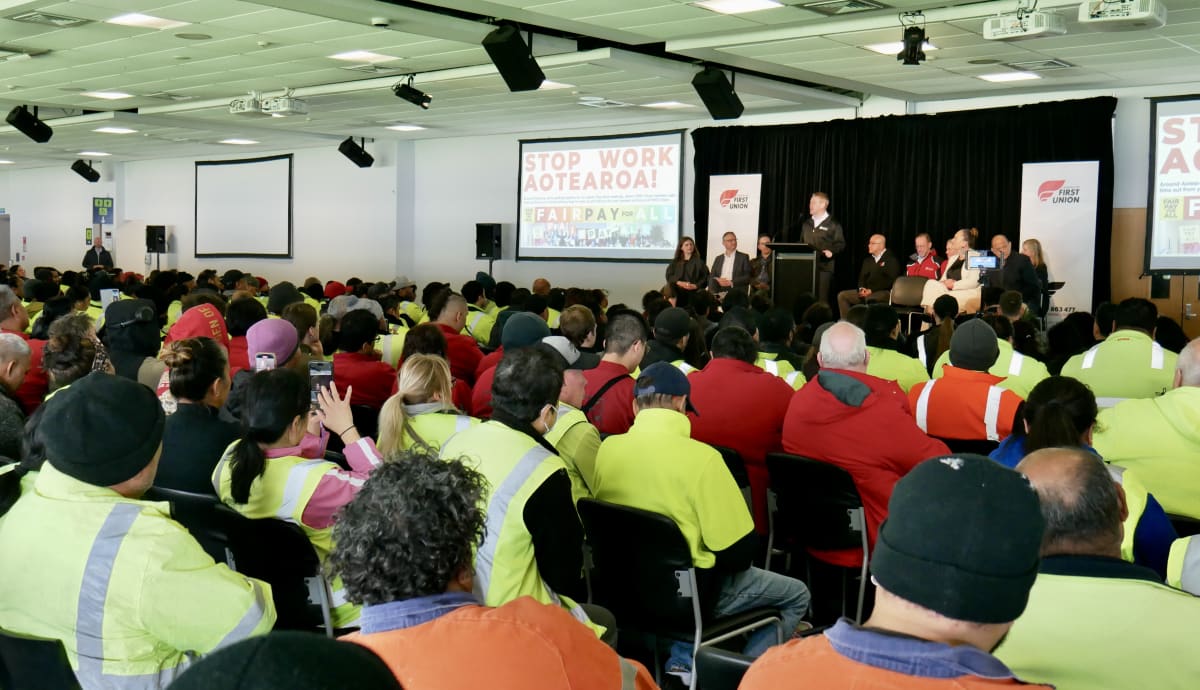
Chris Hipkins says if National wins, 'Māori lose', while Christopher Luxon calls him a 'desperate individual' as time runs out to pull any last campaign tricks out of the bag
Prime Minister Chris Hipkins appealed today to two important overlapping Labour voter bases to try and shore up a last-minute victory.
With just two days left until voting closes and a set of polls showing a slightly narrowed gap between the left and the right, things are looking more hopeful for Hipkins than they have in months.
READ MORE:
* The electorates National has on its hit-list
* Winston Peters on what it takes to form a government
A tardy bump in the polls might be too little too late for Labour – there are just 50 hours to go at the time of writing, and they must seem to be running through Hipkins' fingers at a rapid pace.
Still, there are two million votes uncollected. Hipkins was in Auckland today appealing to two traditionally Labour voter bases that he must be thinking house a fair number of those votes – the unions and Māori and Pasifika populations of South Auckland.
Hipkins was welcomed onto Ngā Whare Waatea Marae in Māngere this morning along with a hefty entourage of Labour MPs.

In his speech he made a point of differentiating himself from the centre-right triumvirate of Christopher Luxon, David Seymour and Winston Peters by accusing them of being a step backwards for race relations and fomenting racism on the campaign trail.
After being greeted by a gaggle of schoolchildren with a tight kapa haka performance as he approached the marae, Hipkins said what he had seen on the election trail made him worry for the kids.
“Our kids have heard candidates standing to be MPs refer to Māori as a disease, to be cut out and buried,” he said.
“Children have scrolled past social media posts from the Act Party stating tough on crime – the best policy for Māori. And they’ve heard Christopher Luxon say 'Well buddy, you’ve got to vote on October 14 to get me into government' when asked about signs that say ‘kura’ ... as well as school.”
Hipkins compared the centre-right’s campaign with Don Brash’s 2005 Iwi/Kiwi billboards, which many see as a nadir in race relations populism.
“In 2005, I used to get incensed driving down the Hutt road and seeing those Iwi/Kiwi billboards,” Hipkins said. “I was outraged that a mainstream party would so blatantly seek to divide us. But Don Brash didn’t win that election. And in the closing days of this campaign my message to New Zealanders is let’s ensure Christopher Luxon doesn’t win either. Because if Christopher Luxon wins, Maōri lose.”
It’s a drum Hipkins has been beating since the Newshub leaders' debate at the end of September, when he first trotted out New Zealand First candidate Rob Ballantyne’s controversial comments. At the time many pundits said he’d arrived at the debate with a new fire.
Perhaps it all came down to that first leaders' debate, when a pair of quick-fire rounds from moderator, TVNZ's Jessica Mutch McKay, showed how similar the two Chrises were.
A new focus on Māori affairs gave Hipkins a point of difference that would split off at least some of the undecided middle.
He followed up the last debate with a rousing speech in Kawakawa where he called out race-bating and dog-whistling – but a few days later he had to isolate in an Auckland hotel room with Covid-19 and his new fire looked to be all but extinguished.
But now in the eleventh hour, with a friendlier poll result at his back, Hipkins is distancing his party from the right, to lure in those two million yet to vote.
He told media his path to power was getting people out to vote, especially in South Auckland.
It turns out Hipkins himself was among those two million. He dropped his vote into the box with little fanfare at the Māngere Arts Centre, joined by Auckland councillor Alf Filipaina.

Then it was on to a packed First Union meeting at Mt Smart Stadium, where Labour MPs were joined on stage by James Shaw, Chlöe Swarbrick and Ricardo Menéndez March of the Greens to comment on what a centre-left government would mean for the working class.
Hipkins again used the opportunity to differentiate Labour from parties on the other side, pointing to wins like paid parental leave, increased minimum wage and fair pay agreements as reasons the workers should stick with Labour.
“The profits from their hard work should be shared, not captured by a small minority,” he said. “That is the New Zealand that I want to see for all of us.”

One audience member said tax was too high and wanted a promise that the government would use tax revenue wisely.
“That’s very important for us,” he said.
Hipkins argued tax cuts didn't serve the working class.
“The thing about cutting taxes is that working New Zealanders don’t actually get the majority of the benefit from that,” he said. “When you cut taxes, you actually make life more expensive for New Zealanders, because of all of the things they are proposing to cut in order to pay for those tax reductions.”
He pointed to the costs of childcare, prescriptions and public transport as government spending that would put pressure on the budgets of everyday Kiwis if cut.
And when it came to spending wisely: “We’ve absolutely got to make sure that every dollar that we are spending is a dollar that is being well spent. But let’s talk about the extra money that we are spending.”
Then he listed a number of government expenses difficult to argue with: $150m extra a week into superannuation, “because we want those who are living in retirement to not live in poverty”, an extra $200m a week for the health system, “to make sure we are paying our nurses, our doctors, the orderlies who clean our hospitals”, and an extra weekly $100m into education.
“We’ve got to make sure that we are paying all of those people in the public sector properly,” he said. “That’s where the extra money is going, it goes into people. When you cut taxes, you cut funding for people.”
On the other side of the stage, the Green MPs were nodding along – although one can imagine they were thinking of Hipkins' captain’s call to rule out a wealth or capital gains tax. His distaste for tax reform means it would be a hard policy for anyone to get across the table.
But Hipkins also rolled out his relationship with the Greens as something that makes him different to Luxon.
He thanked the Greens for a positive working relationship based on shared values and a common vision for New Zealand.
It was a point that obviously contrasted with his depiction of the centre-right three-headed hydra of Luxon, Seymour and Peters – “They’d be trying to sit around a Cabinet table, taking potshots at each other every day and holding the country to ransom”.
He told the audience he and Shaw went way back to even before they were ministers, a comment that drew comparison to Luxon’s own assessment of his relationship with potential co-governor Peters: “I don’t know him.”
Luxon kept his Thursday on the campaign short and sweet to fit in some prep before facing Hipkins in the final head-to-head leaders’ debate tonight.
The National leader and his education spokesperson Erica Stanford visited the BestStart Te Atatu childcare centre where Luxon made Play-Doh chips and pizza with several of the children.
National Party supporters had turned up in their party colours with placards in hand to chant him in and out of the venue.
None of the children Luxon was engaging with were anywhere near voting age, but at this point he seemed to be going for the parent vote and pictures on the 6pm news of him playing with kids was the strategy on the second to last day of campaigning.
Before heading home to get debate-ready, Luxon addressed media, saying he was very chill ahead of squaring off with Hipkins later that evening.
Asked what he made of Hipkins’ speech earlier in the day and the Labour leader saying "If National wins, Māori lose", Luxon replied, “If National wins, Labour loses and that’s a very good thing for New Zealand”.
“Chris Hipkins is a very, very desperate individual now and he’s been throwing muck at walls for weeks on weeks and seeing what sticks and I just think that’s a very low blow.”
Luxon said National governments and Māori had worked well together previously, and in the past six months he’d been “quietly having one-on-one sessions with iwi leaders across the country”.
He didn't believe Māori outcomes had improved under the Labour Government.
The two leaders clash one last time Thursday evening to try to convince the shrinking pool of undecided voters to come their way.







